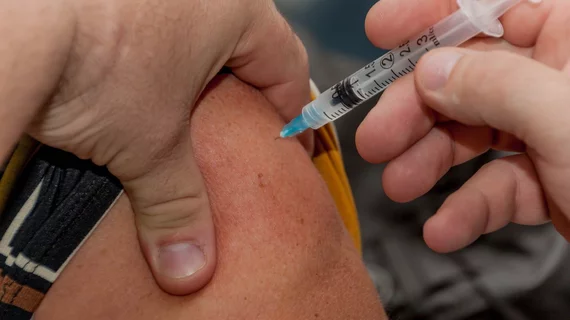Flu vaccine after heart attack reduces risk of death
Patients with myocardial infarction or high-risk coronary disease who get an early influenza vaccination have lower risk of all-cause death, MI or stent thrombosis at 12 months, according to research presented at ESC Congress 2021.
The researchers found that during influenza epidemics more people die due to cardiovascular causes compared with non-epidemic periods. And while influenza vaccination is recommended for patients with heart disease, it is not part of standard hospital care for patients who have had an MI.
“Our findings suggest that influenza vaccination should be considered as part of in-hospital treatment after myocardial infarction,” Ole Fröbert, MD, of Örebro University, Sweden, said in a press release.
As part of the IAMI trial—the largest trial designed to evaluate whether influenza vaccination improves outcomes following MI or percutaneous coronary intervention (PCI) in high-risk patients with coronary artery disease (CAD)—researchers analyzed patients at 30 hospitals in eight countries over four influenza seasons from October 2016 through February 2020.
In the analysis, 6,696 patients were screened, of which 2,571 were randomized and 2,532 received the influenza vaccination or placebo and were included in a modified intention-to-treat analysis.
Eighteen percent of the patients were women, and the mean patient age was 60 years old. The study cohort received either the influenza vaccine or placebo within 72 hours of an invasive coronary procedure or hospitalization.
According to the authors the primary endpoint was a composite of all-cause death, MI, or stent thrombosis at 12 months.
Due to the COVID-19 pandemic, the trial was halted prematurely on April 7, 2020, by the data safety and monitoring board after 2,571 patients, (58% of the target) were enrolled.
The primary composite endpoint occurred in 67 patients in the vaccine group and 91 in the placebo group. Concerning secondary endpoints, death from any cause occurred in 37 patients in the vaccine group and 61 in the placebo group. Rates of cardiovascular death were 2.7% and 4.5%, respectively. There was no difference reported between groups in the rate of MI, which occurred in 2% and 2.4% of patients in the vaccine and placebo groups, respectively.
According to the authors, serious adverse events were infrequent and of similar type and incidence in the vaccinated and placebo groups. Whereas injection site reactions such as pain, redness, swelling, and hardening were reported considerably more often in patients assigned to influenza vaccine.
In an interview conducted at ECS 2021, Fröbert said he hoped that the COVID-19 vaccination would make people more aware of the importance of vaccination in general. “Perhaps some who have received the COVID vaccine will now understand how important also other vaccines are, that’s really an important issue.”
See the full study here.
